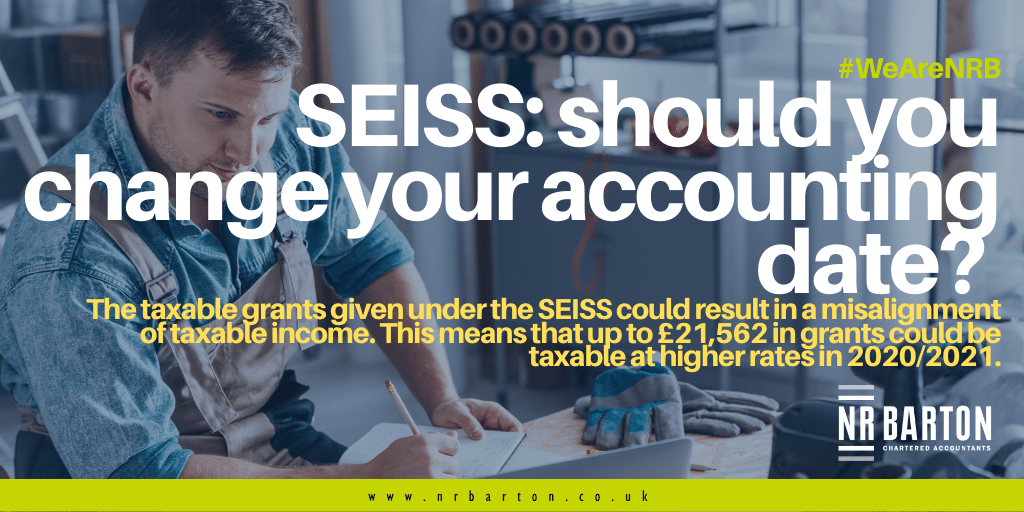The SEISS allowed self-employed individuals and partnerships to receive taxable grants if their business has been adversely affected by the coronavirus pandemic. The first three grants were given in the tax year 2020/2021, although the profits which the SEISS grants substitute for might have been taxed in a later year.
This means that even though a business’ profits may have been significantly less than usual, the misalignment of taxable income means up to £21,562 in SEISS grants could be taxable at higher rates in 2020/2021.
- What is Overlap Relief?
- Conditions that must be met
- Will changing my accounting date affect Making Tax Digital?
For some traders, having SEISS grants taxed on a cash received basis increases the disruption to their usual pattern of taxable income and related tax payments. Bunching income together like this could result in personal taxable allowances being wasted in the following year. This would be particularly devastating if you had also paid an increased level of taxation the year prior.
If you have an accounting date other than 5 April, it may be possible to mitigate, or even improve, the short-term outcome by establishing whether a change of accounting date may be beneficial, particularly if there is overlap relief available.
What is Overlap Relief?
Overlap relief is the amount of profits which were doubly taxed when the business began. Some or all of the overlap profits are deducted in the final period of the business or on an accounting date change. Overlap relief effectively devalues as inflation lessens its significance over the years.
An accounting date early in the tax year such as 30 April has often been used to reduce tax payments in the early years of a business, with the ultimate pay-back being a long final basis period. Taking the long view of future tax liabilities, a change of accounting date in 2020/2021 may be worthwhile even if there is little or no overlap relief available.
Conditions that must be met:
If a change of accounting date takes place in the fourth or later year of a business, there are 3 conditions which must be met:
- The first accounts to the new date must not exceed 18 months.
The extended period can be longer than 18 months, but at least two sets of accounts would be necessary.
- A notice of the change of accounting date must be given
An individual can do this by ticking the relevant box on the self-assessment tax return for the year of change. This normally means a deadline for making the change of 31 January 2022 for accounting date changes that take effect in 2020/2021.
It is now too late for a change of date in 2019/2020. However, overlap relief used in 2019/2020 does affect the calculations for the SEISS grant 4 and 5.
- Where there has been an earlier change of accounting date
If this earlier change resulted in a change of basis period, and that has also happened in the last five years, the latest change must be made for commercial reasons which must be set out in the tax return.
However, obtaining a tax advantage is not a commercial reason and HMRC has only 60 days from receiving the tax return to give notice that they consider a change not to be for commercial reasons. After receiving this notice, the trader then has 30 days to appeal.
HMRC’s examples in its business income manual at BIM81060 onwards are instructive – but if any of the conditions are not met, the accounting date and basis period remain unchanged and the opportunity is lost.
Will Changing My Accounting Date Affect Making Tax Digital?
Any change in the accounting date in 2020/2021 is likely to impact on the start date for Making Tax Digital for Income Tax Self-Assessment (MTD ITSA) for sole traders, which will be mandatory for accounting periods beginning on or after 6 April 2023.
It comes down to a choice between 31 March and 5 April as a new accounting date, 31 March gives the option of postponing the inevitable entry into the MTD ITSA regime until 1 April 2024 without precluding those ready, willing, and able from being early adopters of MTD ITSA.
This is particularly interesting, especially if it could save you money. If you have any questions about the content in this article, please contact your usual Partner or Manager, or call us on 01942 242 245, and we will be happy to help.


